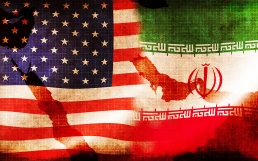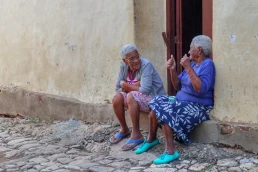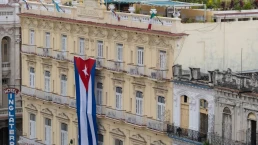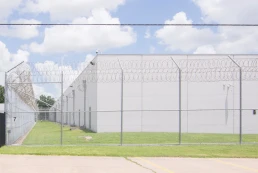Guantanamo symbolizes oppression, injustice, torture and lawlessness. And the United States is its greatest captive.
By Mansoor Adayfi, Middle East Monitor
It was 21 years ago this month that I was flown in the belly of a US cargo plane, hooded, blindfolded, gagged and chained in an orange jumpsuit, for over 40 hours. I didn’t know where I was being taken, or why.
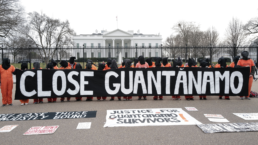
My journey into the unknown started when I was sold to the CIA as an “Egyptian Al-Qaida general” in 2001 after the US invaded Afghanistan. I was 18 years old, and I am from Yemen. After I was imprisoned for around three months in a black site in Afghanistan, I was taken to Kandahar military prison, an airbase that served as a transit station to the unknown. I wasn’t the only one being held there.
When a huge cargo plane landed in Kandahar three weeks later, we all knew that some of us would disappear. Without being able to see, hear or speak, we were dragged to the first plane blindfolded, and then chained to the floor. It was a journey of pain and suffering. When the plane eventually landed, we hoped it would be the end to our suffering. It wasn’t. It was only the beginning of a longer, more brutal journey.
Soldiers never seem to get tired of the beating and shouting. When the second flight ended, it was still not the end of the journey. The US marines snatched and dragged me onto a bus, and then onto a ferry. Where was I going? The first clue came from the sea, which was the first friend who welcomed me. A marine shouted in English and an Arab marine translated: “You are under the control of the US marines!” They continued to shout and physically assault us for the rest of the way.
The ferry eventually docked and a bus took us on the final leg of the journey. We were disembarked by being snatched, one after another. I was forced to sit on my knees for hours. The duct tape over my mouth blocked my screams. Every cell in my body was screaming but no one could hear my cries. They could see the pain, and I felt like maybe their twisted humanity was screaming back, too.
After going through the processing station —where we experienced humiliation and degradation over and over again — soldiers dragged my naked body over sharp gravel to a cage where an IRF (Immediate Reaction Force) team piled on top of me and started removing the chains violently; then the hood, goggles, earmuffs and the duct tape. Soldiers shouted into my ears, “DETAINEE 441! STOP RESISTING!” Resisting? I was barely breathing. Without knowing it, what they did at that moment was introduce the word “resist” into my mental landscape. That’s what I needed to do; I just had no idea how.
At night, it took a while for my sight to come back, but it was still blurry. All I could see was an ocean of orange figures caged just like me, all I could hear were rattling chains, slamming doors, soldiers shouting in their loudest voice, “SHUT THE F**K UP, DON’T LOOK AT ME, LOOK DOWN, NO TALKING!” The dogs barking in the near distance sounded less aggressive than them. The barking never stopped. As in never. It sounded as though they were protesting at the inhumane treatment in their own way.
On my first morning in Guantanamo Bay Detention Camp — for that is where I was — I took a long look around me. I found myself caged in a rose chain-link cage where even animals wouldn’t survive. There were many others there too. I could see swollen faces with bruises, black eyes, shaved heads and faces, split lips and bleeding wounds. We all looked the same. It was like a signature that the soldiers wanted to leave on us all. US President George W. Bush and his administration needed to prove that they were “winning” the “War on Terror”, so they called us the worst of the worst.
We were dragged to this unknown place from different parts of the world; some of us were sold for a bounty and some were handed over to the CIA by their own governments. It was the first time in history that such a thing was done: there we were; 800 men and children — yes, children — from 50 nationalities, speaking over 20 different languages, having different mindsets and cultures, snatched and flown to a dark hole hidden from the rest of the world. This American prison camp wasn’t even in America.
Everything was taken from us, and we became just orange figures with numbers printed on a bracelet locked on our wrists. Our captors stripped us of our freedom and imprisoned our bodies and wanted to control us and deny our humanity, but they failed to understand that what really makes us unique individuals are characteristics such as our names, values, relations, morals, beliefs, ethics, emotions, memories, language, knowledge, experiences, talents, feelings, dreams, nationalities and, of course, our innate distinctive humanity. These were part of another DNA, and a survival kit which the US government didn’t want to know about. They thought that they could control our bodies and freedom, but they would never control our hearts and souls.
Yes, we were isolated and disconnected from our families and the rest of the world, but even in America’s dark hole, life won. We created our own world. Yes, we were tortured and abused, but we also sang, danced, resisted and survived. Also, we soon found other generous guests at Guantanamo who came to visit us regularly, who challenged the US restrictions and never had CIA clearance to visit. They came to share our meals, to listen to us, and to tell us that everything will be okay. We became friends and families with the iguanas, cats, birds and banana rats.
Guantanamo started with a selection of Muslims from around the world, but it kept changing, evolving and growing. We lived through Camp X-Ray, Camp Delta, Camp 5, Camp 6, Camp Echo and others. We went through the torture programmes and abuse by interrogators, psychologists and a whole host of camp staff. We went on hunger strike to protest against the torture and injustice, only to be tortured more. We lived through all the years of Guantanamo: we lived through its Dark Age, its Golden Age, and back again to the Dark Age. With each year we grew older and our imprisonment only settled into us more deeply. Our captors got more creative in developing torture techniques to break us and to try to turn us into something we were not.
To survive through the darkness in that dark hole, we only had each other and whatever makes us human beings. We were fathers, husbands, brothers and sons from different parts of the world. Some of us were teachers, doctors, soldiers, commanders, journalists, lawyers, tribal elders, mafia men, poets and professors; and some were spies. We had no shared life before Guantanamo, nothing in common. At first, we started introducing ourselves to each other, and getting to know each other. I wish our captives had taken time to get to know who we really were as well, instead of just needing to prove that we were hardened terrorists.
The cycle of hardship and the torture we endured forged strong bonds of brotherhood and friendship that helped us to survive. We started developing a new shared life and a new “us” at Guantanamo. Our brains started constructing new memories, relations, knowledge and experiences, but everything related back to and was based on Guantanamo life. Sharing our knowledge, experience and culture with each other created a beautiful Guantanamo where we sang songs in different languages, danced dances from different cultures, and laughed and cried together. After years, we grew together and became part of each other’s lives and memories. Guantanamo became part of us and part of our life. Guantanamo kept growing, evolving and changing, feeding on our lives and humanity. With it, we grew old too.
We weren’t the only victims of Guantanamo: all Americans and America’s values and justice system were as well. There were many Americans who came to work in the detention camp, and they became victims too when they refused to abandon their humanity and treat us badly. Some took a stand against the system and were imprisoned; others were fired or demoted. We fought for them as much as we fought for each other because they were humans and victims too, regardless of their nationality or which side they were on. Injustice has no boundaries, colour or nationality. As we were living in Guantanamo, we didn’t want anyone else to experience it.
Through the Dark Age of 2002-2010, we protested and carried out hunger strikes for years. We fought back as much as we could; we learned from each other and taught each other. In Guantanamo’s Golden Age we learned English and art; we painted and we made ships, cabinets, trees, all from remnants of trash and leftover cardboard.
In Guantanamo, I grew up, from a young boy to a caged man. My world was Guantanamo and it’s where half of my life was taken, where days, months and years were the same.
Then after around 15 years, I was forced to leave Guantanamo the way that I was taken there, hooded and chained. When they came to tell me about my release, they told me, “You have no choice.” I made peace with Guantanamo in Guantanamo and made the decision that it wouldn’t change me; it’s part of me and of who I am.
The whole world agrees that Guantanamo is a stain on our humanity and one of the biggest human right violations of the 21st century. There are those who tortured and abused us at Guantanamo who are still bragging about their time there and their work. Their humanity was the first real victim of that place.
Despite all these reflections, though, Guantanamo hasn’t left us yet. Even today, there are 34 men still in Guantanamo, 20 of whom have been cleared for release. There are many calls for the closure of America’s black hole detention centre. For us, closing Guantanamo does not only mean shutting down the facility, but also there being full accountability for the US government for what happened there: acknowledgment of the cruel and inhumane treatment, a full and unreserved apology, and reparations for the victims.
Guantanamo symbolises oppression, injustice, torture and lawlessness. In this way, Guantanamo is now everywhere, and I can say — in the strangest of ironies — that even though we were prisoners of the US destructive “War on Terror”, the United States is and always has been a prisoner of its own violence. Guantanamo is yet another chapter of this violence and one whose legacy will live on long after the prison is closed. The United State of America itself is Guantanamo’s greatest captive.
Recent Posts
The Iranian Trap: Neither Military Action Nor Nuclear Negotiations Can Solve Trump’s (and Israel’s) Conundrum
February 16, 2026
Take Action Now After a failed regime-change strategy and an increasingly risky military buildup, the Trump administration turns back to nuclear…
Suffocating an Island: What the U.S. Blockade Is Doing to Cuba
February 16, 2026
Take Action Now Electric motorcycles are Cuba’s response to the fuel crisis.By Medea Benjamin Marta Jiménez, a hairdresser in Cuba’s eastern city…
For Trump and Rubio, Colonizing Cuba Is Not About Freedom—It’s About Their Own Egos
February 15, 2026
Take Action Now For Trump, regime change in Cuba will cement his legacy. For Rubio, it will mark the culmination of his childhood dream. In their…
Trump’s Concentration Camp Build-Out Includes Nearly $40 Billion for Warehouse Conversions
February 14, 2026
Take Action Now “Germany’s concentration camps didn’t start as instruments of mass murder, and neither have ours,” wrote talk show host Thom…

